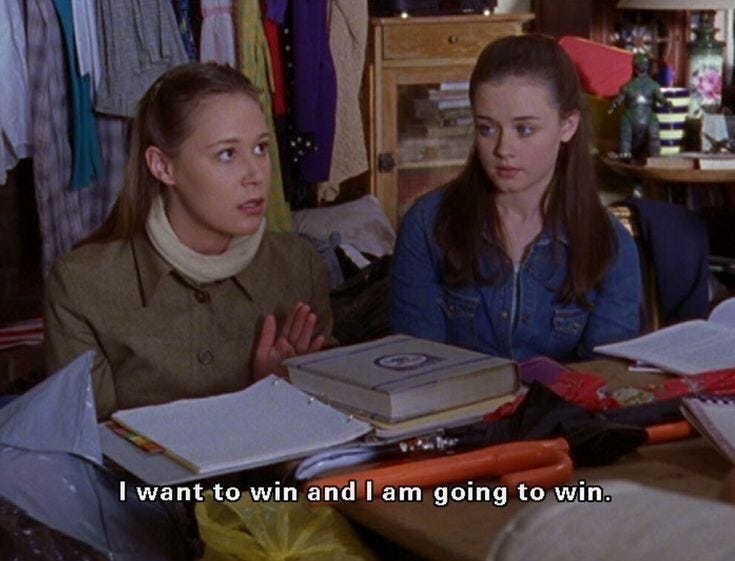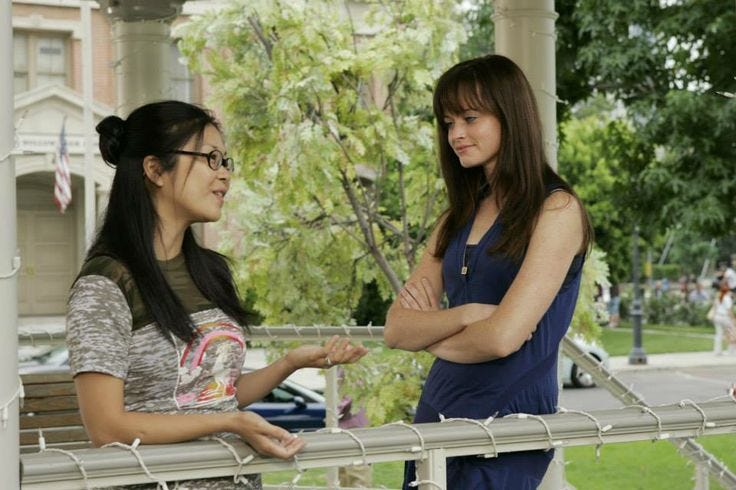Rory Gilmore's Quirky Misogyny: The Aesthetic of Main Character Feminism
How does Rory Gilmore serve the patriarchy, and how does the aesthetic, charming show that is Gilmore Girls justify internalized misogyny?
As the fall season of rewatching beloved TV shows comes to an end, despite the rain trickling down my windows every day, I find myself returning to my reflections around Gilmore Girls, mainly its titular main character, Rory Gilmore, whom I have come to resent for everything she comes to be a representative of.
Like everyone, I rewatch Gilmore Girls once in a while to enjoy its familiarity, coziness, and heart-warming humor. This time, I found myself criticizing Rory Gilmore too much, maybe even in every episode. Her lack of self-awareness is painful to watch as she repeats the same mistakes without ever learning from them. Rory can’t exactly learn from them when she never faces them in the first place, because in every struggle she intellectualizes her feelings instead of sitting with them, using those moments to reaffirm her self-image and seek validation. Her refusal to challenge her own behaviors and thought patterns becomes a ritual that exposes the frustrating aspect of her character: internalized misogyny.
Rory Gilmore's habit of intellectualizing her emotions is reflected in her othering of girls. The other girls are girls who “crumble” after their breakups, girls who love makeup, girls who cheerlead, and girls who sell beauty products and make out with their boyfriends in public spaces. In short, girls who infiltrate the tightly woven safety blanket around Rory's world– who threaten her aesthetic values of being “effortlessly pretty and needlessly smart”. These values are cultivated in the small-town community she’s lived in with a mother whom she can't criticize and who can't criticize her— a successful mother-daughter friendship in which Rory never faces any critique, and the whole town reinforces this trait by constantly praising her beauty and intellect, qualities that the townspeople shouldn’t be the judge of, and yet they are. The show’s representation of this loving and supporting environment poses the question: Who can hold a candle to Rory Gilmore?
She builds her identity around an angelic stereotype who does no wrong, who is above criticisms, and who adheres to performing perfection. The archetype of angelic women has been imposed upon women for centuries, refusing to to see us with depth and complexity as flawed humans. Rory’s identity is performative, based on the validation of others. She embraces this societal and political archetype fully without any awareness. She fails to recognize her privileges, even with the books she surrounds herself with to become one of the voices of women she admires. She doesn’t question the foundation of her values or the source of her self-image. When someone else points out her actions— when she calls another girl a hippo in her review while striving for ‘authenticity’, or when she jeopardizes her future by stealing a boat with her pretty, rich boyfriend, she can’t take it, because she does not understand the reasoning behind their criticism.
This isn't to say Rory's misogyny is caused solely by her self-sabotaging tendencies. These moments stem deeply from her unrecognized privilege which she actively takes advantage of, and also from her embodiment of a modernized “good girl” archetype. She misunderstands the core tenets that make up her identity because she does not care about endorsing intellectualism or feminism, both of which she values. Her self-perception is both baseless and unexamined, and her “othering” is consequently the belittlement of women she views as the opposite of herself– the casualty of her insecurity. Her takeaway from feminism, despite her claim of being a feminist, is her mom's "rebellious" act of naming her daughter after her because "men do it all the time", and that she should support women in the work field, as long as they don't work for her boyfriend.
The show focuses on Lorelai’s rebellion of leaving her family to raise her daughter as a teenage mom, but the fact that Lorelai never properly lived her girlhood due to the systemic sexism of her family is hardly talked about. The pressure of her family which she runs away from is acknowledged as a suffocating environment without the realization that it is due to internalized misogyny and gender roles imposed upon Lorelai. Her rebelling to her family is misunderstood even by Rory, and her family’s complex history is not enough to challenge her ideals. Her grandmother always knew she would want to be a trophy wife for the man she married out of love, yet Rory belittles women of her age who do the same thing (aka Dean's wife) out of self-righteousness. That hypocrisy is not acknowledged. That she gave up on her education and cut ties with her mother, whom she claims to be her hero, because a man told her she couldn't be a journalist? We get a half-assed acknowledgment without substance to show that dropping out of Yale is not for Rory. Unfortunately, Rory never realizes how small her world of women is, and as a result, she doesn’t grow intellectually or emotionally. The worst part is not her ignorance, rarely pointed out by the people around her, but her treatment of women like the privileged and ignorant perspective she preserves is all that there is to them, her consequent actions feeding directly into the show's aesthetic.
How performative can it get?
Very. Most of it falls at the feet of the show’s writers. Why they never managed to give Rory a proper friendship from which she grew is beyond me. Maybe they found it boring to authentically portray friendships that are both validating and fulfilling. Maybe they never cared to disrupt the narrative of Rory as a “radical” bookworm so everyone could become comforted by her charming world. It has no real bite to it after all. When you hold a candle to her relationships with girls her age, you see that any opportunity for Rory to widen her perspective gets taken away from her to serve this bubble to protect her. There is no need to portray any other friendships besides the surface-level friendship that she has with Lane. When she tries to have one with other girls, Rory only comes to the conclusion that she's not like them. Think of the sorority episode, where Rory joins a secret society of girls, and those girls who are portrayed as superficial, rich, and wild teenagers kidnap her and get her into trouble. What a wasted opportunity! Chilton, Rory’s school, that urged her to shed her isolated skin, becomes the villain at the end for trying to prevent her from becoming antisocial. They clearly can’t have a proper perspective of how Rory’s world works. We get it, her isolation is meant to be quirky and relatable, because she is too smart and driven compared to the girls around her… except for Paris, who is, of course, pitted against Rory, them being the smartest girls in Chilton– but this is only true at the beginning.
Paris is everything that Rory is not. Loud, decisive, relentlessly determined, smart and political, driven through ambition. Her background which still remains unexplored, other than two-minute gimmicks with her Mexican nurse, is complex and full of the tangled intricacies of family and friendship. Despite the show pitting her and Rory against each other, seemingly because Paris is too competitive to accept her, they end up growing together. Paris challenges Rory. She is the only one to do it without any sugar-coating. Even though their evolving friendship continues to be threatened, for instance when the self-absorbed Francis drives them apart in the spirit of women competing against each other, Rory improves because of Paris’ perseverance in shining a light through the cracks of Rory’s bubble. Yet, they ruin Paris’ character, transforming her into another tool to serve the storyline that centers on college. Rory in Yale achieves the peak of her smart girl status quo, struggling to receive validation for her cleverness. It takes even more effort to keep crafting the future she has dreamed of since she was eight while she maintains the carefully built image of herself. Paris is made a laughing stock. It gives new heights to the word ridiculous with her continuously written off as a caricature of the neurotic traits with which she is known. Rory rolling her eyes and saying Paris condescendingly becomes common. Paris’ ambition, which was once the point of her character– that she matched the intellect of Rory and added her own trait of leadership, is pushed aside to make way for her bizarre sense of discipline and exaggerated social unawareness. At some point, she stops challenging Rory and gives into the perfect image of brains and beauty that she harmfully represents. How else are you supposed to root for Rory Gilmore?
I no longer do. Her treatment of Lane, the only woman of color in the show along with her mother, drives the knife through the heart for my opinion of Rory Gilmore. Lane is the most poignant character of the show to prove that Rory is a performative, white ‘feminist’ who concerns herself with problems that affect her directly.
Their friendship never thrives, rather it exists for Rory's needs and comfort. When Rory has relationship problems and needs validation, Lane is there. When Rory has problems with her mother, Lane is there. When Rory has nowhere to go, Lane is always there, doing the best that she can despite having her own issues. What about when Lane is suffocated at home, frustrated over being the unseen daughter? When Lane is scared for her freedom when she suspects she has to move out to Korea forever? Rory can't be there, she is with Dean. When Lane moves out and works at Luke's full time, despite having so much creativity and rebellion in her to deserve accomplishing her dreams as much as Rory? Well, she stays at Rory's dormitory for some time, but that's about it. That's the most they've spent together when Rory is in college, anyway. Even in earlier seasons, we see Lorelai rooting harder for the broken relationship between Lane and her mother, even if it is because she relates to Lane. Lane, a complex character with talent and drive to imagine a world in which she can seek out her dreams despite facing so much suppression, is reduced to a lazy storyline to re-center Rory's image, as has been done with Paris. If the show had put Lane and Paris as its main characters, Rory would be nothing of substantial importance whose only scenes involved reading books and being cute about it. Through everything we see from Rory’s perspective, no complexity of girlhood and girl friendships are represented with realism and authenticity.
I enjoy the show's light spirit and charming ambiance, so I keep returning to it during the fall season. With a hot cup of tea in my hands and a book on my shelf that I keep putting off, watching Gilmore Girls is a distraction I can afford at my lazy moments, but the show’s relevance stops at that. As the show progresses, there turns out to be very few storylines that I can enjoy without criticizing, How I wish Rory could be someone to look up to as someone who genuinely uses her privileges, and uplifts women in her landscape of education, and later journalism! Aestheticism, then, could be used thoughtfully, with a thriving main character who evolves into an honest version of herself– but Rory never grows into what she imagines herself to be. Her cozy aesthetic is reduced to a tool to beautifully wrap up the archetype of a “cool girl” who reads books and hates women.








This was very clearly written and poignant, really pleasant to read